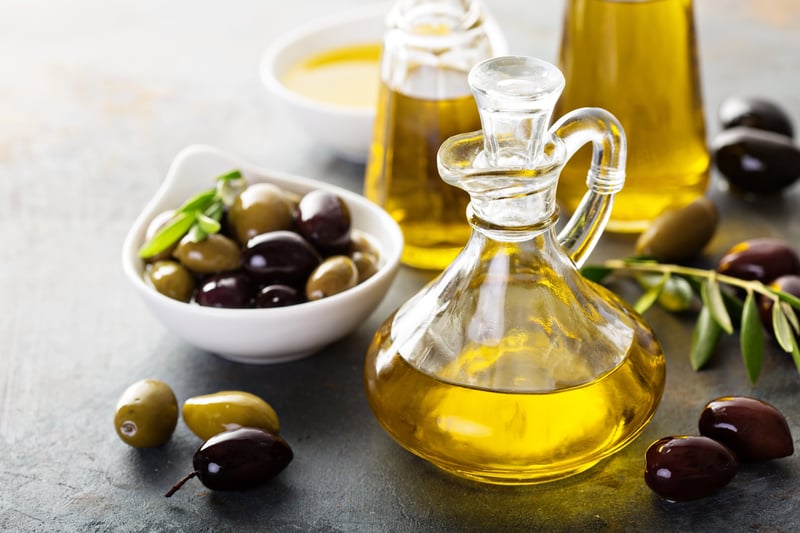Get Healthy!

- Amy Norton
- Posted July 24, 2023
Olive Oil a Powerful Prescription Against Dementia
People looking to stay mentally sharp as they age might want to swap out margarine for olive oil, a preliminary study suggests.
The study, of more than 90,000 U.S. health professionals, found that olive oil lovers were less likely to die of dementia over the next three decades.
Compared with their counterparts who rarely used olive oil, those who consumed more than a half-tablespoon a day were 28% less likely to die of dementia.
Based on the researchers' estimates, a small diet change could make a significant difference: Trading in one daily teaspoon of margarine for the same amount of olive oil might trim the risk of death from dementia by up to 14%.
The findings were being presented Monday at the annual meeting of the American Society for Nutrition, in Boston. They're considered preliminary because they have not been published in a peer-reviewed journal.
And, experts said, studies like this can only show correlations -- and not proof that olive oil protects the aging brain.
"That said, omega-3 fatty acids are known to provide anti-inflammatory benefits, and olive oil is a good source of omega-3s," said Connie Diekman, a St. Louis-based nutrition consultant who was not involved in the study.
Inflammation is believed to be involved in the dementia process, and that's one plausible way that regularly eating olive oil could be beneficial, according to Diekman, who is also a former president of the Academy of Nutrition and Dietetics.
Beyond that, past studies have linked the Mediterranean diet (famously rich in olive oil) to better memory and thinking skills in older adults, and a lower risk of developing dementia.
In the new study, though, olive oil itself -- independent of overall diet -- was tied to a lower risk of death from dementia.
"Even when accounting for diet quality, we saw this association," said researcher Anne-Julie Tessier, a postdoctoral fellow at the Harvard School of Public Health.
Past studies have suggested that a diet rich in olive oil can reduce the risk of heart attack and stroke, possibly by helping to improve blood pressure, cholesterol, blood vessel function and more.
What's good for the heart is also good for the brain, and better cardiovascular health is thought to curb the risk of dementia.
But, Tessier said, cardiovascular health did not explain the link between olive oil and lower dementia risk in this study group.
Instead, she said, there may be something about the nutrients in olive oil. It has, for example, an array of plant compounds called polyphenols, which have anti-inflammatory and antioxidant properties.
This study can't answer the "why" or "how." But, Tessier said, it's also a reasonable move for people to exchange their margarine for olive oil.
The findings are based on more than 90,000 U.S. medical professionals who were part of either of two long-running studies that regularly assessed their health and lifestyle habits. When they entered the studies in 1990, they were 56 years old, on average.
Over the next 28 years, 4,749 study participants died of dementia. That risk was 28% lower among people who consumed more than a half-tablespoon of olive oil a day.
Based on the data, the researchers calculated that replacing just one daily teaspoon of margarine or mayonnaise with olive oil could lower the risk of dying from dementia by 8% to 14%.
There is no single magic bullet against dementia, and experts believe that many factors in people's environment and lifestyle are important to healthy brain aging. An ongoing trial run by the Alzheimer's Association is testing whether a combination of lifestyle changes -- including a healthy diet high in plant foods, regular exercise and mental stimulation -- can slow older adults' cognitive decline.
So people should pay attention to overall diet, not a single food, Tessier and Diekman said.
"What science does show," Diekman said, "is that more plant foods and fewer animal foods appear to provide a better base for overall health."
At the same time, Tessier said, replacing other fats with olive oil can be one straightforward diet change. She noted, though, that cost can be an obstacle.
More information
The U.S. National Institute on Aging has more on diet and dementia.
SOURCES: Anne-Julie Tessier, PhD, RD, postdoctoral fellow, Department of Nutrition, Harvard T.H. Chan School of Public Health, Boston; Connie Diekman, RD, MEd, food and nutrition consultant, St. Louis, and former president, Academy of Nutrition and Dietetics; July 24, 2023, presentation, American Society for Nutrition annual meeting, Boston

